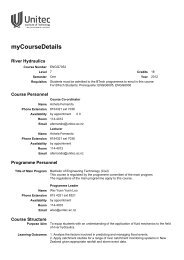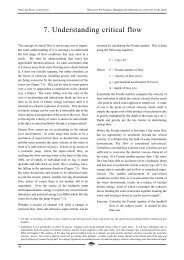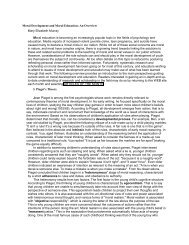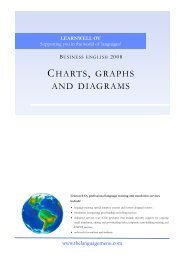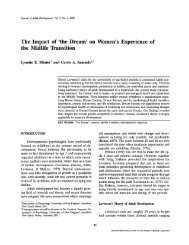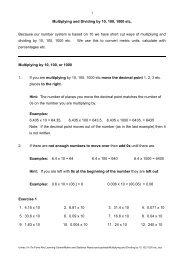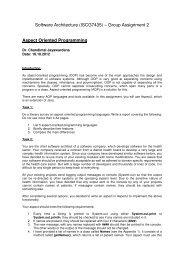WHAT POSTFORMAL THOUGHT IS, AND WHY IT MATTERS
WHAT POSTFORMAL THOUGHT IS, AND WHY IT MATTERS
WHAT POSTFORMAL THOUGHT IS, AND WHY IT MATTERS
You also want an ePaper? Increase the reach of your titles
YUMPU automatically turns print PDFs into web optimized ePapers that Google loves.
324 MICHAEL LAMPORT COMMONS <strong>AND</strong> SARA NORA ROSS<br />
Allen, seeking to understand the Person’s needs and concerns, asks and answers<br />
many questions. Allen also sees if the Person’s body language matches their<br />
statements. Allen asks if the Person is ready to make a choice based on their<br />
previous discussion. Feeling Allen knows best, the Person accepts the guidance<br />
and assistance. (Metasystematic 12)<br />
Instruction: Rate each of the methods above by selecting a number on a scale<br />
from 1 to 6. A rating of 1 means you think the Helper has the worst method. A<br />
rating of 6 means you think the Helper has the best method. Not all the ratings<br />
need to be used. A particular rating may be given to more than one Helper.<br />
Example of the Nonlinear Development of Postformal Action<br />
The concept of task applies to individual actions including thoughts, and accordingly,<br />
the hierarchical complexity of individual actions is measurable. Each action<br />
refers to a task performance. At every stage, an action begins at some baseline<br />
task. That task is usually familiar or available to the person. A Systematic stage<br />
11 action must start from and coordinate two or more Formal stage 10 relations<br />
between abstract stage variables in order to create a systematic conceptual system.<br />
Likewise, a Metasystematic stage 12 thought must start from and coordinate two<br />
or more Systematic stage 11 systems in order to create a metasystem.<br />
When a person is beginning to act for the first time on a task, one may begin<br />
one’s actions at a stage that is two or more stages lower than the one-stage difference<br />
described earlier. For example, if a new combination of ideas is presented, or<br />
if new terms must be learned first, one may begin thinking at the concrete, abstract<br />
or formal stage before one continues to think further and produce a Metasystematic<br />
stage statement. Examples are presented in what follows to illustrate this<br />
organic type of development of complex thought. They resulted from presenting<br />
the Formal stage 10 statements to a postformal thinker. From those four statements,<br />
two Systematic stage 11 thoughts were spontaneously developed. While<br />
reflecting on the two systematic thoughts, a Metasystematic stage 12 thought resulted.<br />
It coordinated and transformed the just-previously developed systems with<br />
a memory of a relevant recent comment by another party. The examples indicate<br />
the unpredictability and nonlinearity of increasing hierarchical complexity.<br />
Example 1. Formal 10: (a) “Although my family never hugs, Joe’s family<br />
does, and they look happy to do it. I would be more comfortable if my family<br />
hugged.” (b) “Research shows that hugs in loving families are good for your health.<br />
Therefore, everyone should hug.” Systematic 11: “Social norms of lots of hugging<br />
could lead to more overt abusive contact in families with incest issues. It would<br />
be irresponsible to indiscriminately encourage all families to hug.”<br />
Example 2. Formal 10: (a) “Our region ranks high in estimated unreported<br />
crimes of incest. We have to reduce incest by requiring annual social worker visits<br />
with all children.” (b) “Our region ranks high in the number children over the age<br />
of 6 who get no nurturing physical or emotional contact. A longitudinal study<br />
showed these children were at the greatest risk for delinquent behavior in preteen<br />
years. We must educate all caregivers about children’s needs for nurturing.”<br />
Systematic 11: “It’s the pendulum-swing of doing social work, that half of our



